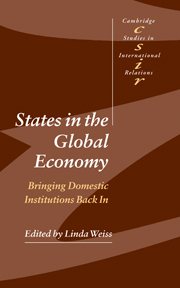Book contents
- Frontmatter
- Contents
- List of figures
- List of tables
- List of contributors
- Preface
- 1 Introduction: bringing domestic institutions back in
- Part I The resilience of welfare states
- Part II New economic challenges, changing state capacities
- Part III Governing globalisation
- 11 Managing openness in India: the social construction of a globalist narrative
- 12 Guiding globalisation in East Asia: new roles for old developmental states
- 13 Governing global finance: financial derivatives, liberal states, and transformative capacity
- 14 Is the state being ‘transformed’ by globalisation?
- List of references
- Index
- CAMBRIDGE STUDIES IN INTERNATIONAL RELATIONS
13 - Governing global finance: financial derivatives, liberal states, and transformative capacity
Published online by Cambridge University Press: 22 September 2009
- Frontmatter
- Contents
- List of figures
- List of tables
- List of contributors
- Preface
- 1 Introduction: bringing domestic institutions back in
- Part I The resilience of welfare states
- Part II New economic challenges, changing state capacities
- Part III Governing globalisation
- 11 Managing openness in India: the social construction of a globalist narrative
- 12 Guiding globalisation in East Asia: new roles for old developmental states
- 13 Governing global finance: financial derivatives, liberal states, and transformative capacity
- 14 Is the state being ‘transformed’ by globalisation?
- List of references
- Index
- CAMBRIDGE STUDIES IN INTERNATIONAL RELATIONS
Summary
The creation and spectacular growth of global, over-the-counter derivatives markets pose a very stern challenge to traditional modes of regulation by nation-states of financial markets. These markets are truly global in that they transcend borders. In fact, derivatives are financial instruments whose very purpose is to take some of the financial risks out of investing across borders. Many derivatives markets do not fall within the jurisdiction of one nation-state alone, but are the potential responsibility of any number of nation-states. Moreover, a relatively small number of complex, global financial services firms dominate these markets, while being active in most of the principal financial centres of the developed and developing world.
Prudential supervision and regulation of these firms and markets thus pose a singular challenge for any given nation-state. If that state is capable only of supervising and regulating the activities of the given global firm within its own territory, it will have a very partial, and arguably, inadequate view of the financial health of that firm. What is more, the nation-state might worry that if its supervision and regulation were to appear too demanding to a given number of global firms, they might simply transfer aspects of their business to another financial centre where the regulatory touch was more to their liking. The signing and execution of over-the-counter derivatives contracts can be physically located in any number of places.
This chapter investigates how two nation-states, the United Kingdom and the US, have responded to the challenge of global derivatives markets.
- Type
- Chapter
- Information
- States in the Global EconomyBringing Domestic Institutions Back In, pp. 271 - 292Publisher: Cambridge University PressPrint publication year: 2003
- 7
- Cited by

